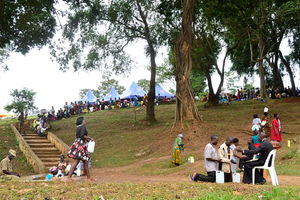
A pilgrim drinks ‘Holy Water’ from a well at the Anglican Martyrs’ site at Namugongo on June 1. PHOTO/FRANK BAGUMA
Experts have warned that the pilgrims who will consume ‘Holy Water’ from the Martyrs’ shrine and site without treating or boiling it, risk contracting diseases.
Dr Barirega Akankwasa, the executive director of National Environment Management Authority (Nema), told this publication in an interview yesterday that underground water must be treated or boiled to kill germs.
“The water should be treated and boiled. We haven’t taken samples to test and know the quality of the water at Martyrs’ shrine and site, but we would recommend that any water should be purified and boiled for the health of the body and mind,” Dr Akankwasa said.
He added that consuming unsafe water leads to bacterial infections and typhoid.
“You can get so many other diseases from bacterial infection. You find people complaining of stomach infections. So, you can get all sorts of diseases when water is contaminated by things like human waste,” he said.
He explained that whereas the piped water is treated by National Water and Sewerage Cooperation, it is safe after boiling.
“The sewage services in Uganda cover a very small proportion of the population. So everybody digs a soak pit and a septic tank. Now the soak pit gets overflow from the septic tank and eventually this sewage gets into the soil and goes into the groundwater system,” he said.
Some pilgrims believe that when they boil the water, it may not serve the purpose, which experts refute.

Pilgrims fetch ‘Holy Water’ at the Anglican Martyrs Site in Namugongo on June 1. PHOTO/FRANK BAGUMA
Dr Akankwansa warned that overflowing septic tanks and poorly designed pit-latrines contaminate groundwater.
“Each soak pit is just stones and the stones are in the soil. It is only the soil that is filtering that sewerage. Part of that filtering ends up in the underground water system when it rains, but even when it has not rained, the soil gets percolated with the sewage. Rain just facilitates now faster movement,” he observed.
Dr Akankwasa’s remarks come days after the clerics at the Namugongo Anglican site warned pilgrims against consuming unboiled ‘Holy Water.’
Rev Esau Bbosa Kimanje, the Vicar of Namugongo Anglican Martyrs’ Site, urged pilgrims to boil or treat the Holy Water before consumption.
He said a recent study undertaken by the management of the Anglican Martyrs site and some experts indicated that the water is contaminated due to poor sanitation practices of the bulging population.
“Underground water is no longer safe. I appeal to pilgrims to boil or treat it before it is consumed to avoid infections,” Rev Kimanje warned.
Rev Simon Peter Ddembelyayes, the director of Missions and Outreach at Church of Uganda, said: “Most of the pilgrims come here to fetch water. They think it’s the water that heals but it’s the faith of a person. The water should be boiled because it comes from the bottom.”
At the Catholic Martyrs Shrine, water is drawn from a man-made lake. However, it is alleged that pilgrims mostly draw water from the Anglican site because most Martyrs were killed there and it allegedly has more blessings.
The Permanent Secretary in the Ministry of Health, Dr Diana Atwine, recently said about 14 million Ugandans still practise open defecation.
According to Dr Atwine, the practice is in both rural and urban areas.
Several studies across the country, especially in the Kampala metropolitan area, indicate that showing that water sources such as springs, which provide a major source of water for the population are contaminated due to poor waste management and badly designed pit-latrines.



